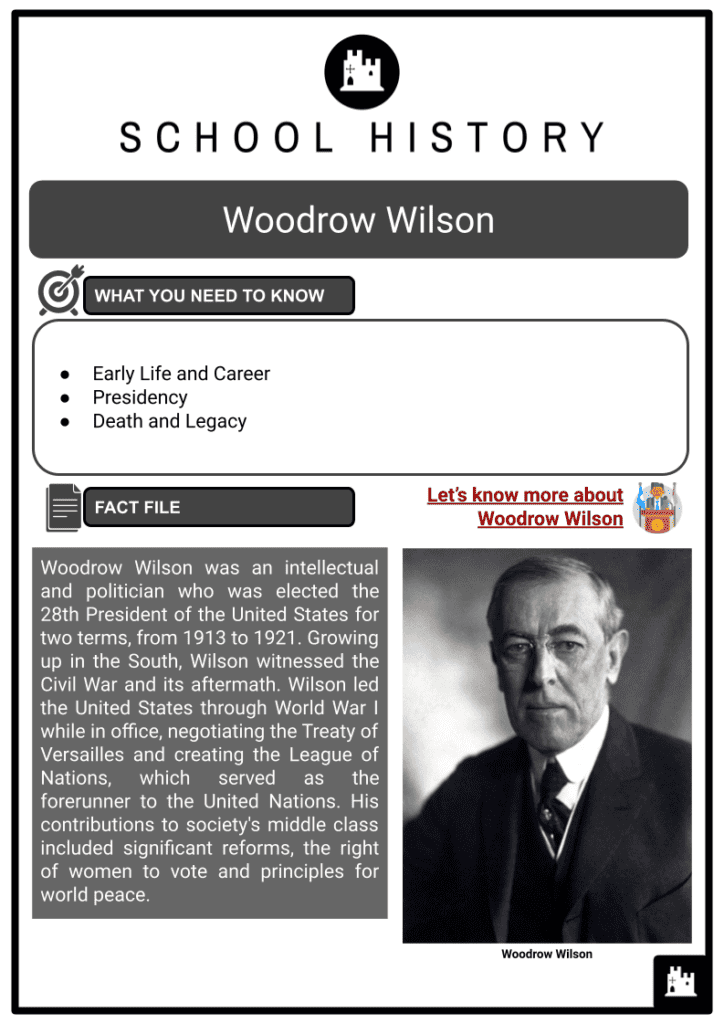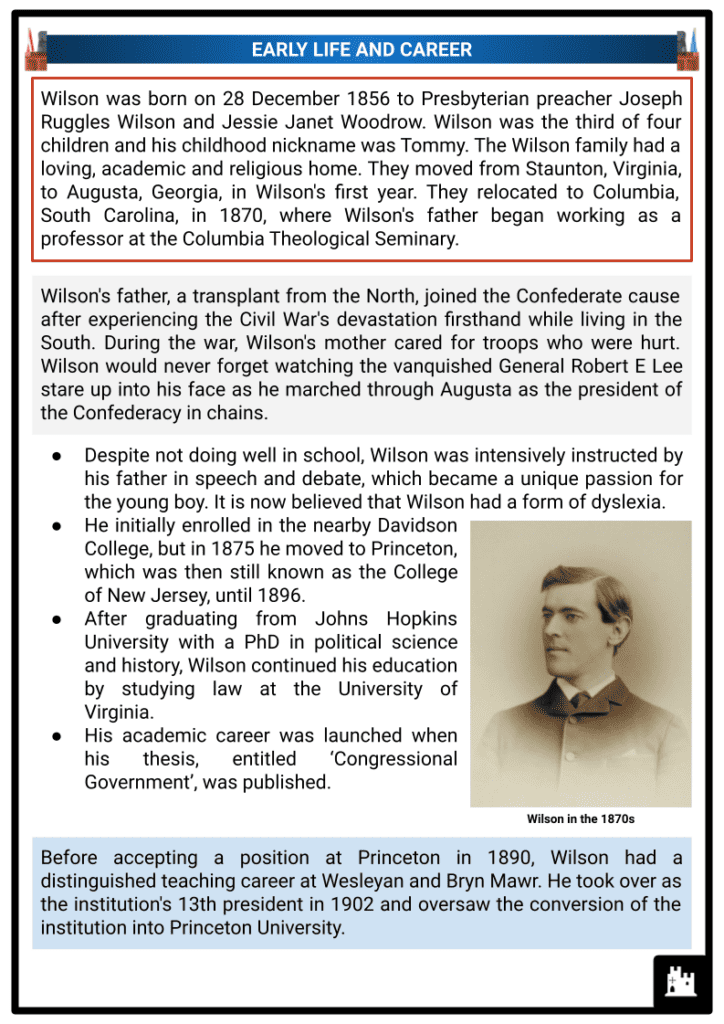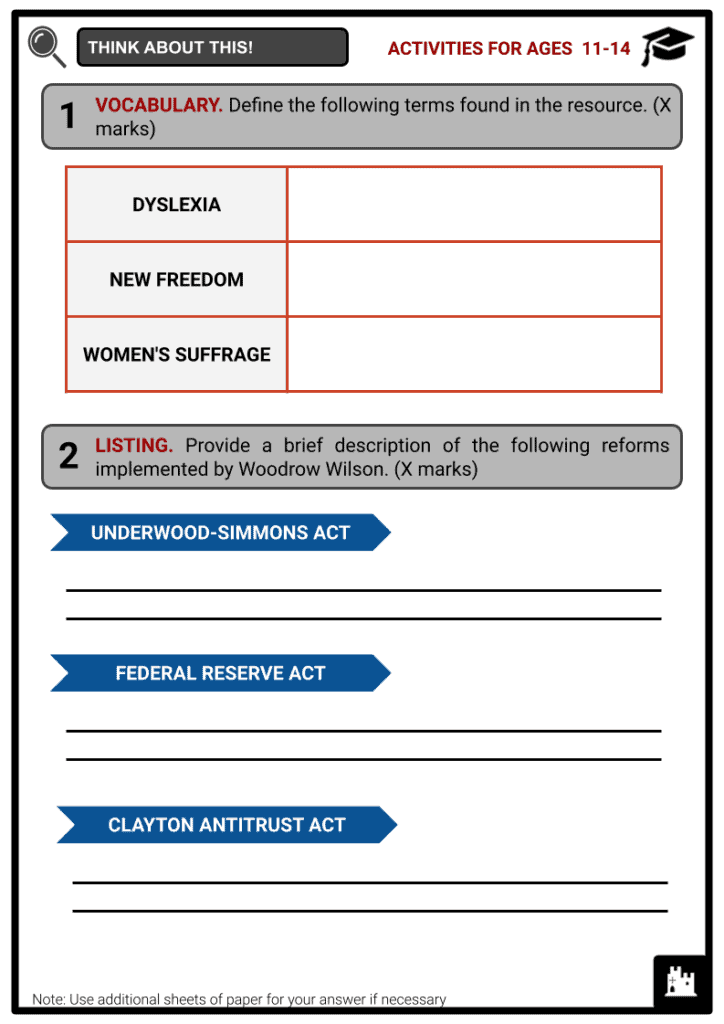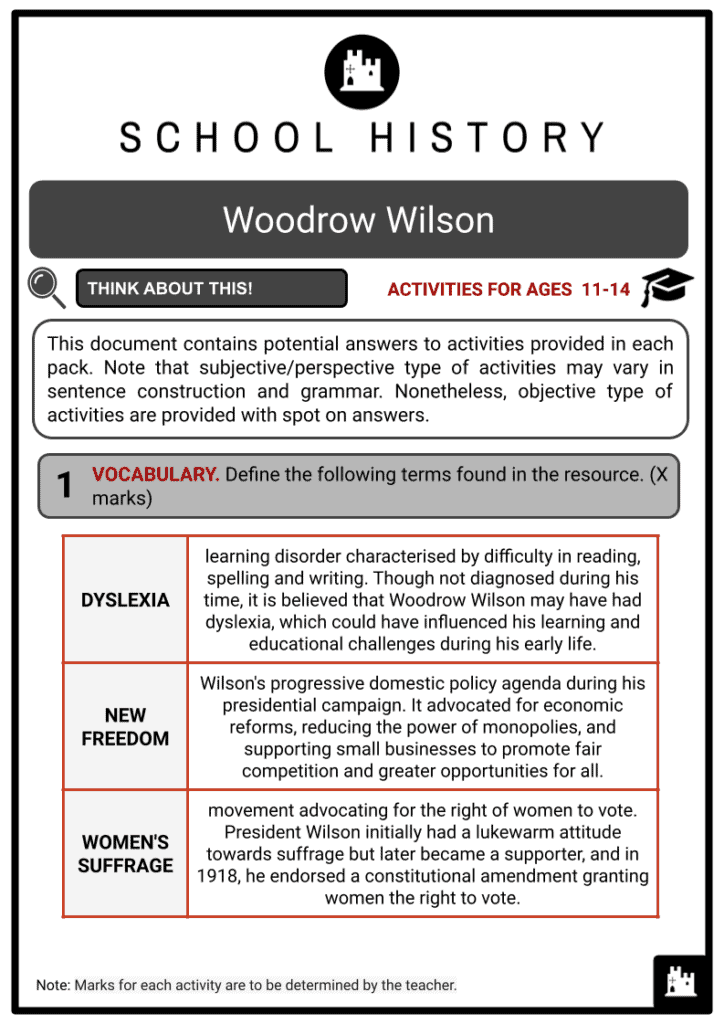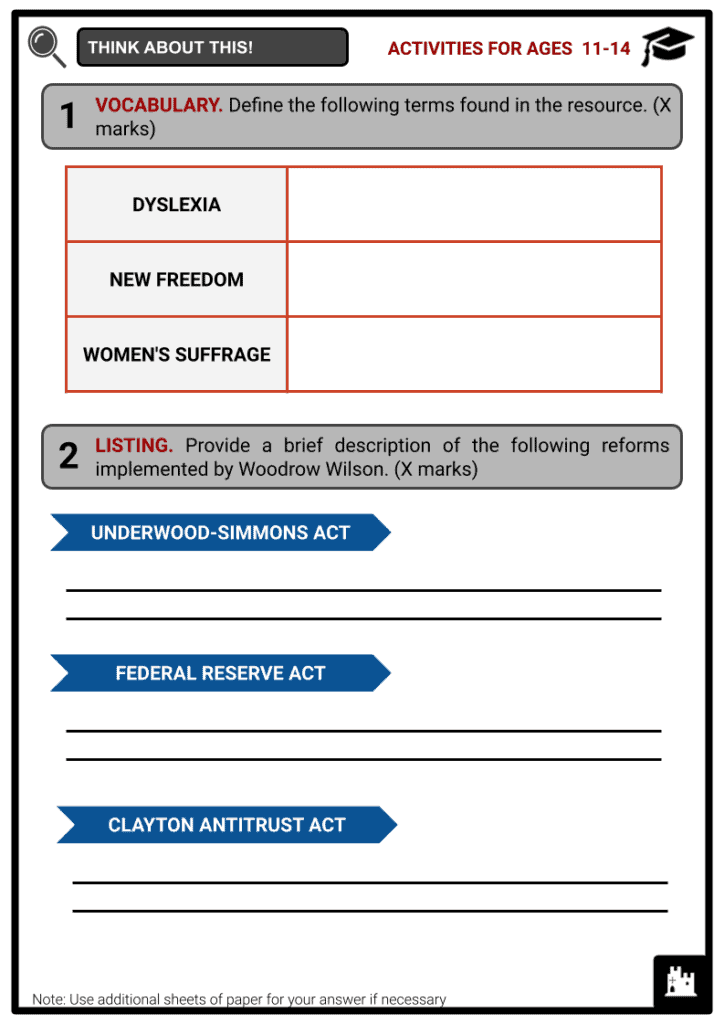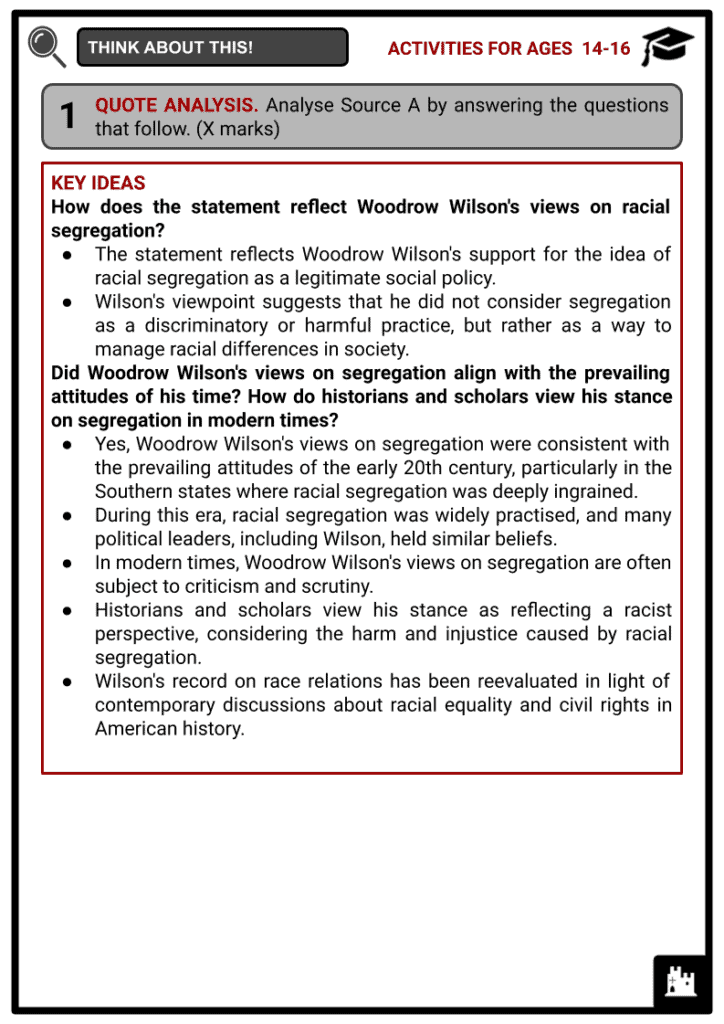Woodrow Wilson Worksheets
Do you want to save dozens of hours in time? Get your evenings and weekends back? Be able to teach about Woodrow Wilson to your students?
Our worksheet bundle includes a fact file and printable worksheets and student activities. Perfect for both the classroom and homeschooling!
Summary
- Early Life and Career
- Presidency
- Death and Legacy
Key Facts And Information
Let’s know more about Woodrow Wilson!
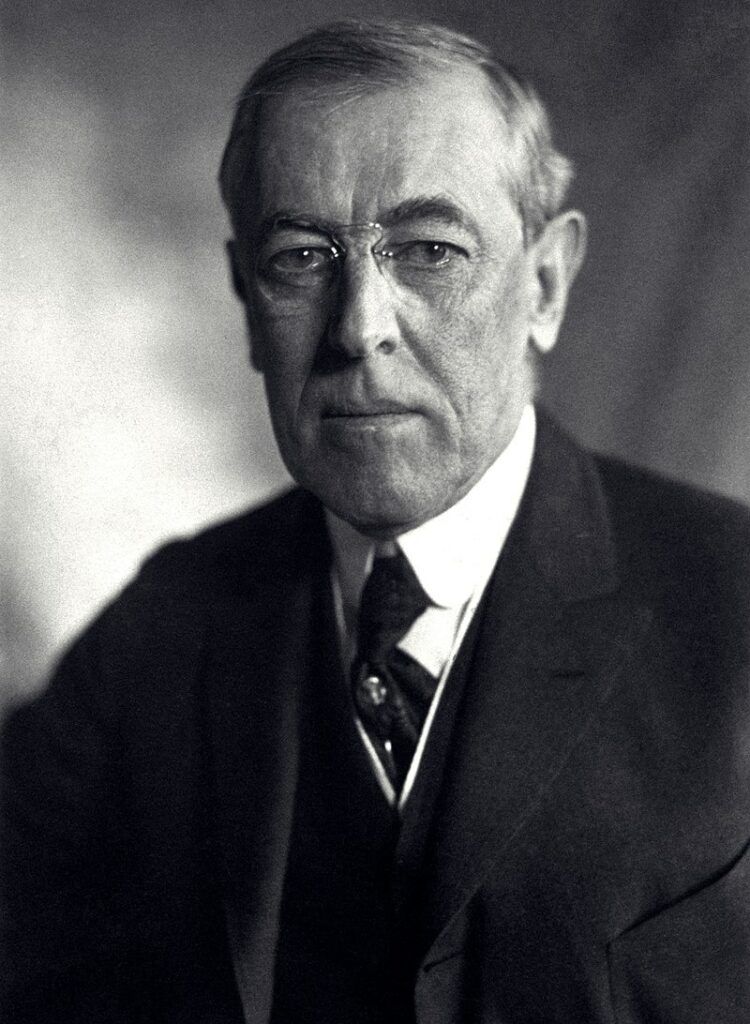
Woodrow Wilson was an intellectual and politician who was elected the 28th President of the United States for two terms, from 1913 to 1921. Growing up in the South, Wilson witnessed the Civil War and its aftermath. Wilson led the United States through World War I while in office, negotiating the Treaty of Versailles and creating the League of Nations, which served as the forerunner to the United Nations. His contributions to society's middle class included significant reforms, the right of women to vote and principles for world peace.
EARLY LIFE AND CAREER
- Wilson was born on 28 December 1856 to Presbyterian preacher Joseph Ruggles Wilson and Jessie Janet Woodrow. Wilson was the third of four children and his childhood nickname was Tommy. The Wilson family had a loving, academic and religious home. They moved from Staunton, Virginia, to Augusta, Georgia, in Wilson's first year. They relocated to Columbia, South Carolina, in 1870, where Wilson's father began working as a professor at the Columbia Theological Seminary.
- Wilson's father, a transplant from the North, joined the Confederate cause after experiencing the Civil War's devastation firsthand while living in the South. During the war, Wilson's mother cared for troops who were hurt. Wilson would never forget watching the vanquished General Robert E Lee stare up into his face as he marched through Augusta as the president of the Confederacy in chains.
- Despite not doing well in school, Wilson was intensively instructed by his father in speech and debate, which became a unique passion for the young boy. It is now believed that Wilson had a form of dyslexia.
- He initially enrolled in the nearby Davidson College, but in 1875 he moved to Princeton, which was then still known as the College of New Jersey, until 1896.
- After graduating from Johns Hopkins University with a PhD in political science and history, Wilson continued his education by studying law at the University of Virginia.
- His academic career was launched when his thesis, entitled ‘Congressional Government’, was published.
- Before accepting a position at Princeton in 1890, Wilson had a distinguished teaching career at Wesleyan and Bryn Mawr. He took over as the institution's 13th president in 1902 and oversaw the conversion of the institution into Princeton University.
- He received praise for his thoughtfulness and creative teaching and was a well-liked teacher. Wilson became well-known outside of academia thanks to his oratory abilities. Tragically, he was at Princeton when he had a serious stroke in May 1906 that put his life at risk. Wilson nevertheless made contributions to education despite the setback.
- When Woodrow Wilson served as governor of New Jersey, he carried out a number of progressive reforms that had a long-lasting effect on the state. He quickly attacked corruption after becoming governor in 1911, adopting strict anti-corruption legislation and establishing a Public Utilities Commission to oversee transport corporations. Wilson had a reputation as a reformer due to his tenacious pursuit of ethical and effective government.
- Championed labour rights, passing legislation to limit working hours for women and children and establishing workers' compensation laws.
- Committed to social justice in education, increased funding for public schools, and focused on improving teacher training and salaries to enhance the quality of education in New Jersey.
- Demonstrated fiscal responsibility as governor, reducing state debt, and advocating for progressive taxation to alleviate the burden on the working class and shift it to the wealthy.
- Economic policies contributed to the state's financial stability and facilitated growth during his tenure as governor of New Jersey.
PRESIDENCY
- Woodrow Wilson was elected as the Democratic Party's nominee for president in 1912, running against Republican incumbent William Howard Taft on the New Freedom platform. Theodore Roosevelt, Taft's predecessor, was unhappy with his administration's performance and decided to run as a third party candidate. Wilson won as a result of the Republican vote being split in two. He took office on 4 March 1913.
- Wilson was elected president as the push for women's suffrage grew.
- He was not entirely in favour of women having the right to vote at first, but his opinions changed with time as women's contributions in the war efforts were proven vital.
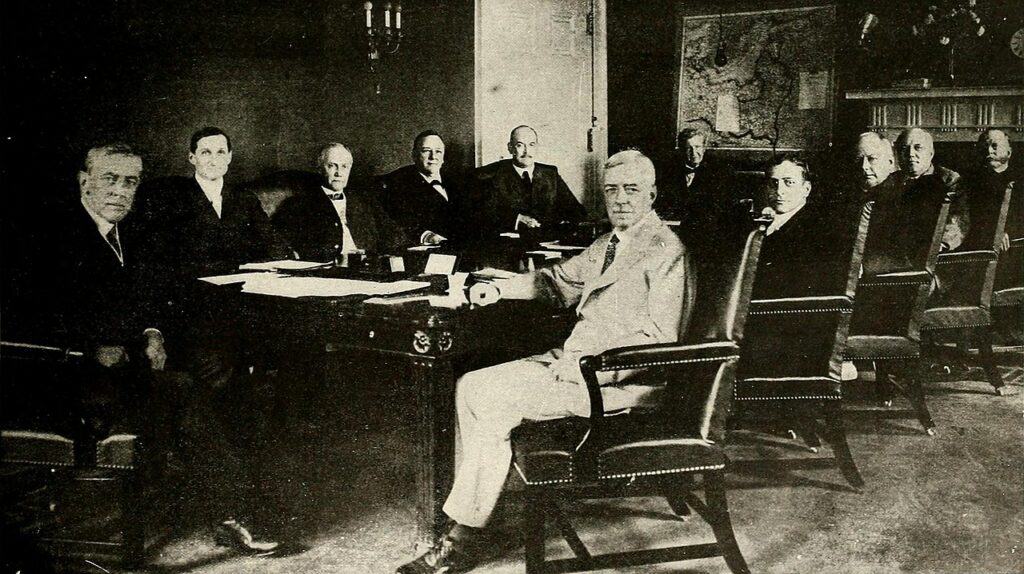
Wilson as President and his Cabinet in 1918 - Suffragists picketed at the White House in 1917, which resulted in arrests and bloodshed.
- Wilson was horrified to learn that protesters who were going on hunger strike were being forced fed.
- He officially supported women's voting rights in a speech before the Senate in January 1918.
- Wilson continued to advocate for the cause alongside his daughter, Jessie Woodrow Wilson Sayre, and wrote and personally contacted members of Congress. The 19th Amendment was finally adopted by a majority of states on 18 August 1920.
- In 1913, Wilson signed the Underwood-Simmons Act, which decreased tax rates that had traditionally favoured industrialists over small businesses. Wilson's New Freedom programme supported small businesses and farmers, and he went after what he labelled the 'Triple Wall of Privilege'. The Federal Reserve Act, which opened up loans to the common American, was also approved by him. With the Clayton Antitrust Act, which encouraged labour unions and permitted strikes, boycotts and peaceful picketing, he further enforced antitrust laws in 1914.
- The assassination of Archduke Francis Ferdinand by a Serbian nationalist in 1914 marked the start of World War I. Many countries later entered the war as a result of agreements reached among the European powers. The Allies, including Britain, France, Russia, Italy, Japan, Portugal, China and Greece, were engaged in combat with the Central Powers – Germany, Austria-Hungary, Turkey and Bulgaria.
- In 1916, during the presidential election, America maintained its neutrality, and Woodrow Wilson and Thomas Marshall were both nominated by the Democrats to run for the presidency.
- Wilson's main slogan during the campaign was 'He kept us out of war', emphasising his commitment to avoiding involvement in World War I.
- The Republican candidate, Charles Evans Hughes, opposed Wilson's policies.
- In a closely contested election, Wilson emerged victorious with 277 out of 534 electoral votes.
- In 1917, the United States entered World War I on the side of the Allies.
- Two significant reasons for the US entry were the sinking of the British ship Lusitania, which resulted in the deaths of 120 Americans, and the discovery of the Zimmerman telegram.
- The Zimmerman telegram revealed Germany's attempt to make an alliance with Mexico in the event of the United States entering the war, further pushing Wilson and the nation towards involvement in the conflict.
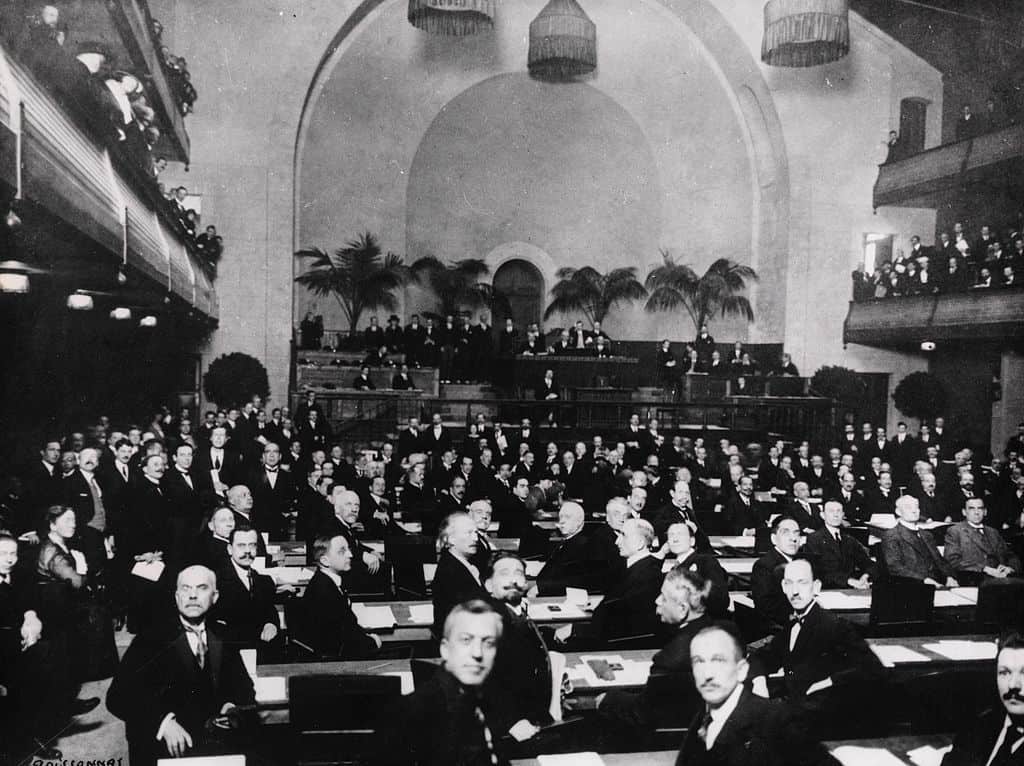
First meeting of the League of Nations in 1920 - Pershing led American soldiers into combat, aiding in the Central Powers' downfall. On 11 November 1918, an armistice was ratified. The 1919 Treaty of Versailles, which attributed the war to Germany and called for significant reparations, was signed. It also established the League of Nations. The US Senate ultimately decided against ratifying the agreement and would never sign up to the League.
DEATH AND LEGACY
- Wilson advocated the 'Fourteen Points' as the framework for the peace agreement at Versailles, with the establishment of the League of Nations as the last point to guarantee global peace. Congress rejected the United States' membership in the League of Nations, despite it being adopted by Europe. Wilson travelled the country in an effort to win over more people to the League. For his efforts, he received the Nobel Peace Prize in 1920.
- After Wilson's second term ended in 1921, his wife and he moved from the White House to a townhouse in the Kalorama area of Washington, DC. Wilson made his last public appearance on 10 November 1923, when he delivered a brief Armistice Day radio address from the library of his home.
- Woodrow Wilson passed away on 3 February 1924, at the age of 67. Since he is the only president whose final resting place is in the nation's capital, he was laid to rest in Washington National Cathedral.
- Motivated by a sense of mission and his father's teachings, Wilson valued the idea of leaving a positive impact on the world.
- His commitment to peace and reform is reflected in institutions like the Woodrow Wilson National Fellowship Foundation and the Woodrow Wilson School of Public and International Affairs at Princeton University.
- These institutions carry on his legacy by promoting education, research and public service in line with Wilson's principles.
- Wilson's vision of social and financial reform continues to inspire efforts towards a more just and equitable society.
- As a statesman, he emphasised integrity and ethical leadership, leaving a lasting impression on the practice of politics and governance.
- His influence reached beyond his presidency, with these institutions and others perpetuating his ideals and principles.
Image Sources
Frequently Asked Questions
- Who was Woodrow Wilson?
From 1913 to 1921, Woodrow Wilson was the 28th President of the United States.
- What is Woodrow Wilson known for?
Woodrow Wilson is known for his leadership during World War I, his efforts to establish the League of Nations, his progressive domestic policies, and his role in shaping the Treaty of Versailles.
- Why did Woodrow Wilson win Nobel Peace Prize?
In 1919, Woodrow Wilson won the Nobel Peace Prize for promoting international cooperation and striving for lasting peace following WWI.

